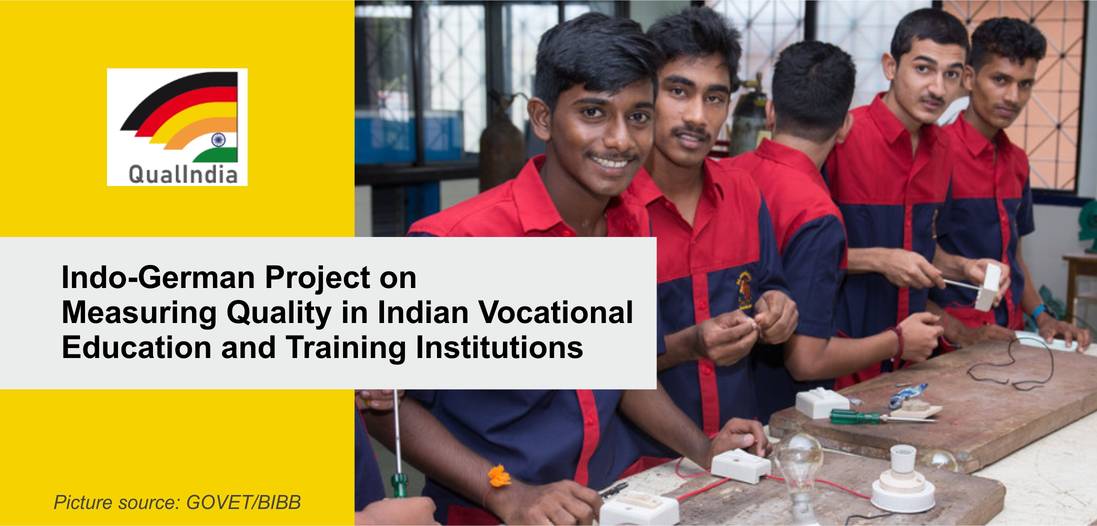 QualIndia is one of the key projects funded by the German Federal Ministry of Education and Research (BMBF) within the scope of the Federal Initiative of Internationalization of Vocational Education and Training. QualIndia focuses on the primary research question: How can quality in Indian vocational education and training institutions be measured comprehensively?
QualIndia is one of the key projects funded by the German Federal Ministry of Education and Research (BMBF) within the scope of the Federal Initiative of Internationalization of Vocational Education and Training. QualIndia focuses on the primary research question: How can quality in Indian vocational education and training institutions be measured comprehensively?
Quality in Indian Vocational Education and Training
Quality in education and training plays a central role both nationally and internationally and it has been the subject of several research and development projects in recent years. In India, processes of quality assurance and development also increasingly came into focus, due to the growing demand for skilled workers. At the same time, however, formal vocational education and training provision in India faces fundamental problems in the area of quality. While the local quality assessment is of particular importance in the given context, it has so far been characterized by incompleteness and a lack of coherence.
Primarily, basic key figures are transmitted by vocational training institutions to government agencies. The micro-level of teaching and learning is yet to be specifically targeted. Hence, there is a fundamental need for research and development concerning the quality of teaching and learning processes and a research gap with regard to a high-quality and complex measurement of quality data in the field.
 QualIndia Project: Objectives, Process and Outcomes
QualIndia Project: Objectives, Process and Outcomes
The basic objective of the project is to develop and provide a demand-oriented quality model adapted to the national context, which will be operationalized and tested in practice. The project is designed as a bilateral research project which is coordinated by the University of Cologne and involves researchers from the Indian Institute of Management Bangalore, the Indira Gandhi National Open University, the Jawaharlal Nehru University and the National University of Educational Planning and Administration.
The overall study will focus on two types of institutions with major importance in India: Industrial Training Institutes (ITIs) and Polytechnic Colleges. This selection allows collection and comparison of data from different parts of the system. In the main study, the quality approach will be tested in 10-15 institutions of each type. In order to capture regional differences in India, field research will focus on two different urban regions, Delhi and Bangalore respectively.
The quality model to be developed explicitly includes the areas of input, process and output of vocational education and training processes and is based on the aggregation of findings from an international literature analysis. In addition to quality aspects concerning the systemic and institutional level of education, special emphasis is placed on the area of teaching and learning.
The development of the model and the associated indicators is carried out in an iterative process in cooperation with the Indian project partners in order to ensure a “cultural fit” at an early stage. Qualitative and quantitative instruments, such as guideline interviews, classroom observations and standardized questionnaires, are developed and used for measurement.
In addition to the application and evaluation of the model and indicators in the main study, the procedure is continuously reviewed by means of discursive reflection with the Indian project partners.
The quality model, the indicators and the measuring instruments developed together with the partner institutions are prepared in the form of a toolbox. This toolbox can be used online via Open Access. The model and its operationalization thus form a sound basis for further quality development and, if necessary, certification processes.
The research findings will be used to formulate concrete and evidence-based recommendations to improve quality in Indian vocational education and training. The scientific findings are made available to relevant actors in India and Germany as well as to a broad readership both nationally and internationally, thus fostering educational policy and scientific discourse.
Authors: Julia Regel, Dr. Muthuveeran Ramasamy, Prof. Dr. Matthias Pilz
E-mail: matthias.pilz@uni-koeln.de; muthu.ramasamy@uni-koeln.de; julia.regel@uni-koeln.de
Further projects: https://wipaed.uni-koeln.de/de/forschen/lehrstuhl-fuer-wirtschafts-und-sozialpaedagogik/great-in-india/
To learn more about Indo-German cooperation in Vocational Education and Training along with details of current initiatives, visit https://nationalskillsnetwork.in/govet-germany/












